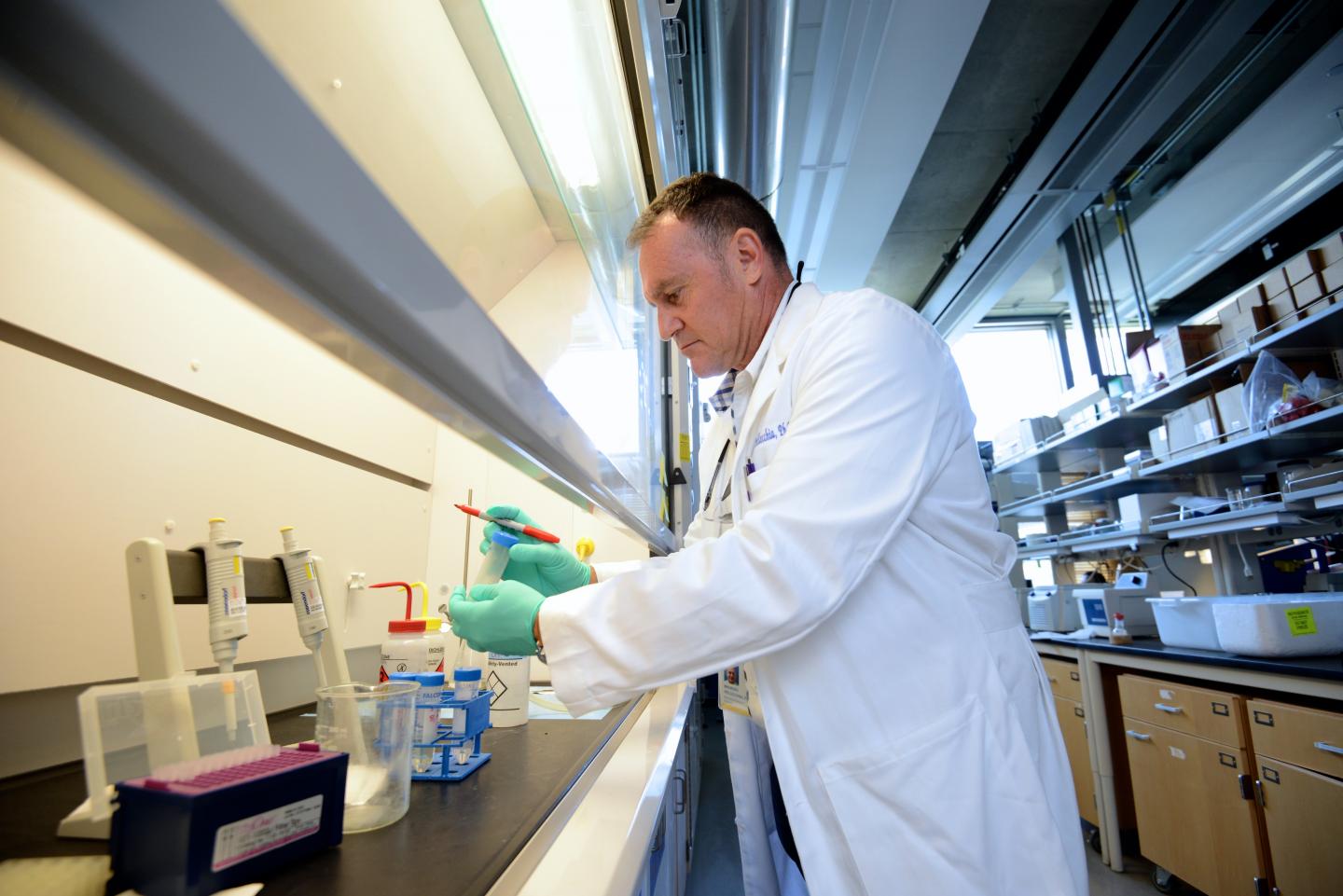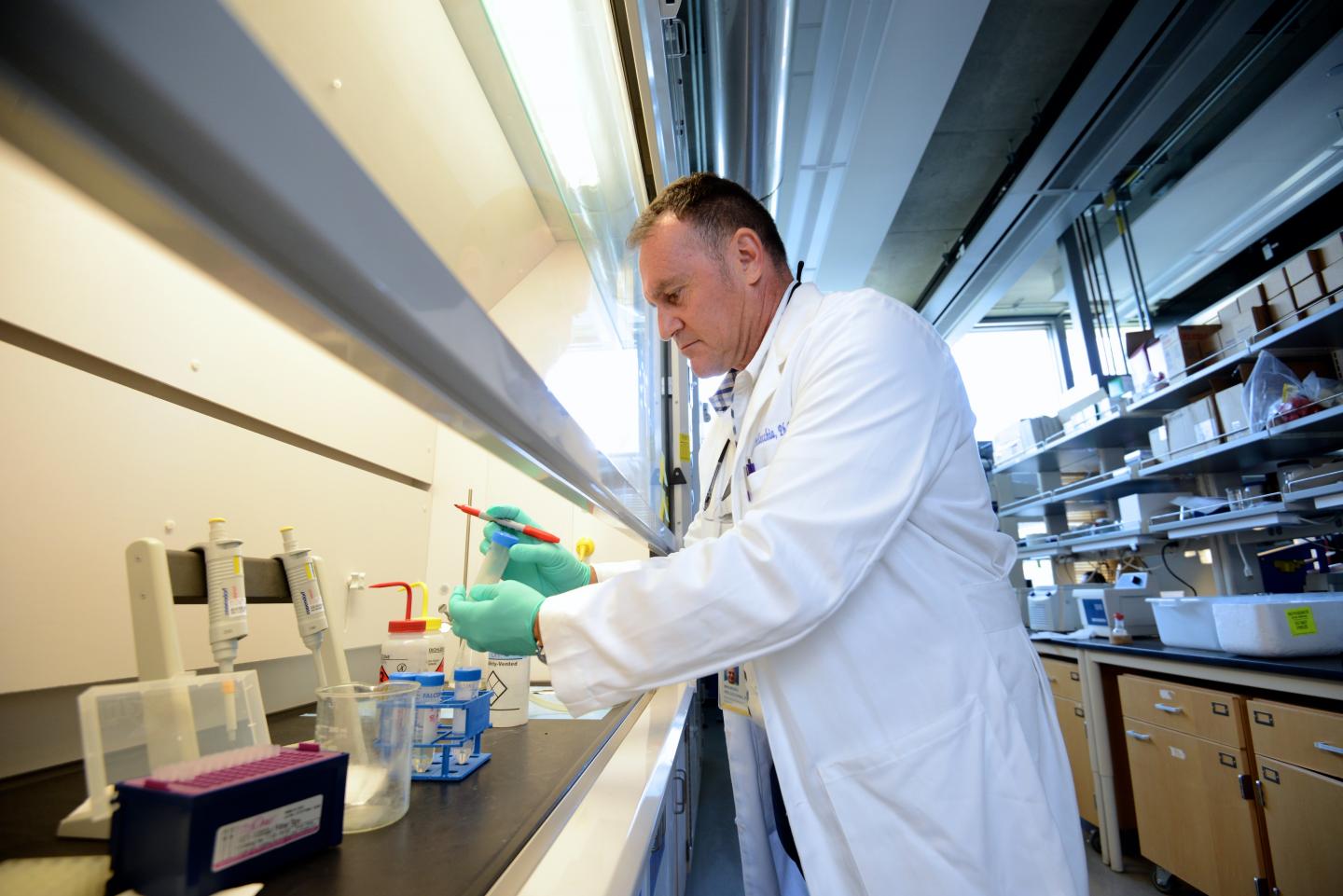
Credit: Carrie Rosema.
RIVERSIDE, Calif. – Maurizio Pellecchia, who holds the Daniel Hays Chair in Cancer Research at the University of California, Riverside, has received two grants to continue his research aimed at finding therapeutics for cancer, amyotrophic lateral sclerosis (ALS), and other neurodegenerative diseases.
The first grant from the U.S.-Egypt Science and Technology Joint Fund of the National Academy of Sciences, Engineering, and Medicine, or NASEM, totals $190,000 for two years. The second is a nearly $2.3 million, five-year grant from the National Institute of Neurological Disorders and Stroke, or NINDS, of the National Institutes of Health, or NIH.
An announcement of funding opportunities in a newsletter issued by the UCR Office of Research and Economic Development caught Pellecchia's attention and led him to apply for the NASEM grant. The selection process was highly competitive: only 15 applications, or 12 percent of all proposals, received funding after being evaluated independently by Egyptian and U.S. reviewers.
The research will focus on the receptor EphA3 (ephrin type-A receptor 3), which plays a key role in cell proliferation in cancer. A receptor is a specialized cell or a group of cells that translates stimulus into nerve impulses.
"We have extensive experience with targeting the EphA2 and EphA4 receptors, with demonstrated ability in using receptor-binding agents for the targeted delivery of drugs to treat prostate cancer, melanoma, renal carcinomas, breast cancer, and leukemia," said Pellecchia, a professor of biomedical sciences at UCR's School of Medicine. "No such agents, however, are currently available that target the EphA3 receptor."
The EphA3 receptor includes an extracellular portion, meaning it is located outside the cell, which interacts with its ligands termed "ephrins." It also has an intracellular portion that directs pro-cancer signals. An overexpression of this receptor over the ephrins creates an excess of receptors that have no ligands bound to them. This signals proliferation and migration of cancer cells, resulting in metastasis. To reduce this unbalance between EphA3 and its ligands, Pellecchia aims to devise synthetic ephrin ligands, which would bind to the EphA3 receptor and facilitate receptor "dimerization," by which the entire receptor-ligand complex gets internalized in a vesicle inside the cancer cell that is then degraded.
The synthetic ligands would be transported to the EphA3 receptors via a nanoparticle, with the ligands covering its surface. The nanoparticle could encapsulate a chemotherapeutic agent, delivering a cytotoxic selectively and directly to EphA3-expressing cancer cells.
Pellecchia will collaborate with Heba F. Salem, a professor of pharmaceutics and drug delivery, and the dean of the faculty of pharmacy at Egypt's Beni-Suef University, who has extensive experience in developing shell-enriched nanoparticles as carriers for drug delivery. Salem has received similar funding from NASEM for the project.
"We are confident that this unique collaborative effort is likely to result in innovative agents that would not only support further cellular and mechanistic studies aimed at validating the EphA3 receptor as a target, but that could also be translated into novel and effective therapeutics for the treatment of melanoma, leukemia, and potentially other tumors," said Pellecchia, who serves as the founding director of the Center for Molecular and Translational Medicine at UCR.
The U.S. Agency for International Development, or USAID, funds NASEM's U.S.-Egypt Science and Technology Joint Fund. USAID administers the U.S. foreign assistance program providing economic and humanitarian assistance in more than 80 countries worldwide.
The NIH/NINDS grant will focus on understanding the detailed mechanism of the EphA4 receptor and how inhibiting it with an agonistic agent could delay the progression of motor neuron diseases such as ALS, also known as Lou Gehrig's disease, as well as Parkinson's disease and gastric cancer.
"Questions we hope to answer are: Can we understand at the mechanistic level how EphA4 modulates ALS and other motor neuron diseases, and can we further improve or derive new agents that can prevent these diseases?" Pellecchia said.
In this research, Pellecchia will collaborate with Iryna Ethell, a professor of biomedical sciences at UCR who studies astrocytes, which are cells found abundantly in the central nervous system. He will also collaborate with Kathrin Meyer of the Nationwide Children's Hospital in Columbus, Ohio, who has a specific assay and tissue bank of astrocytes and motor neurons derived directly from healthy persons and from patients with ALS. A few years ago, Meyer discovered that when astrocytes and motor neurons from a patient with ALS are co-cultured, the astrocytes kill the motor neurons.
"Does the EphA4 receptor have anything to do with this? We would like to find out," Pellecchia said. "Astrocytes contain many ephrin ligands for the EphA4 receptor. We know that motor neurons in ALS patients that express too much EphA4 die more rapidly. Could it be that the astrocytes recognize motor neurons perhaps partly because of EphA4? Our preliminary experiments in cells from ALS patients showed that when motor neurons are treated with an EphA4 agonist we discovered, the astrocytes from ALS patients no longer kill the motor neurons very effectively."
Pellecchia explained that despite tremendous efforts aimed at identifying contributing factors for ALS, the mechanisms underlying motor neuron death have not yet been fully understood and consequently no effective treatment is currently available for ALS. Several clinical trials have been initiated based on drugs selected from animal studies, but these ultimately failed, according to Pellecchia.
"Among the possible reasons for such failures is the lack of a proper drug target responsible for the onset and progression of ALS," he said. "Numerous recent studies clearly suggest the EphA4 receptor is a potential drug target for ALS. We expect our studies, when complete, will provide critical insights on the role of the EphA4 receptor in the progression of ALS. The data gathered in this study will be critical in supporting the development of innovative targeted therapeutics for ALS."
Pellecchia is the scientific founder and a consultant for Iron Horse Therapeutics in San Diego, a biotechnology company focused on developing ALS treatments.
###
The University of California, Riverside is a doctoral research university, a living laboratory for groundbreaking exploration of issues critical to Inland Southern California, the state and communities around the world. Reflecting California's diverse culture, UCR's enrollment is now nearly 23,000 students. The campus opened a medical school in 2013 and has reached the heart of the Coachella Valley by way of the UCR Palm Desert Center. The campus has an annual statewide economic impact of more than $1 billion.
Media Contact
Iqbal Pittalwala
[email protected]
951-827-6050
@UCRiverside
http://www.ucr.edu





